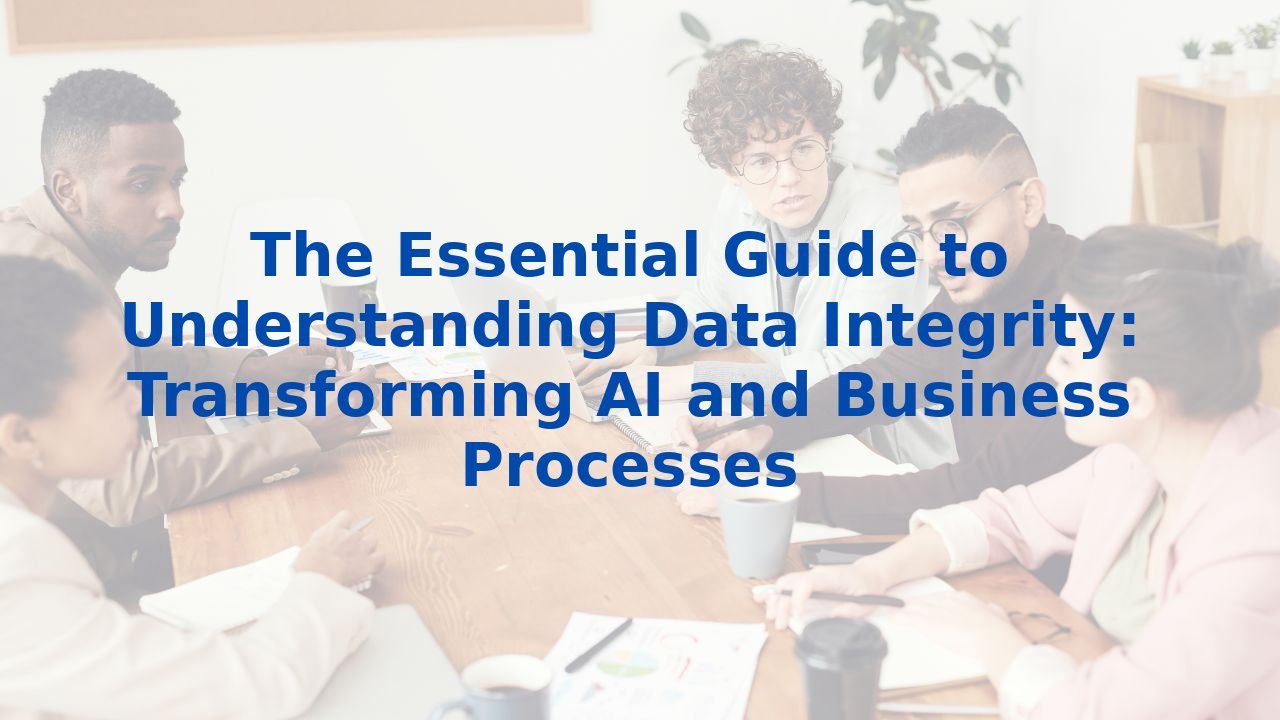The Essential Guide to Understanding Data Integrity: Transforming AI and Business Processes
The Essential Guide to Understanding Data Integrity: Transforming AI and Business Processes
Introduction
In the increasingly data-centric landscape of today, the efficacy of Artificial Intelligence (AI) hinges on one critical element: data integrity. This cornerstone establishes the quality and reliability of the outputs generated by AI systems. Ensuring data integrity not only supports informed decision-making but catalyzes transformative shifts within organizations. This guide aims to illuminate the essence of data integrity, explore its implications for AI performance, and demonstrate how businesses can enrich their processes through rigorous data governance.
Personal Integrity Drives Data Integrity
At its core, data integrity is deeply entwined with personal integrity. This idea revolves around a steadfast commitment to ethical practices and transparency in data handling. When individuals and teams prioritize integrity, they cultivate an environment that fosters accurate, complete, and unbiased data. The influence of this commitment permeates through AI systems, instilling trust and enhancing the quality of the data utilized for training models.
Data Integrity Ensures Data Quality
Data integrity serves as a pillar of data quality, encompassing accuracy, consistency, and reliability. Organizations can bolster data quality through several practices:
- Data Validation: Ensure data quality by verifying it at every stage of the pipeline, confirming it meets necessary standards.
- Data Lineage: Track the origin and trajectory of data, allowing organizations to identify transformations and changes over time.
- Data Provenance: Document all processes in the data pipeline to illuminate data sources and the methods of processing.
Implementing these strategies helps organizations secure high-quality data, which is essential for AI systems relying on precise inputs to yield reliable outputs.
Data Quality Leads to Quality Insights
When AI systems access high-quality data, they generate insights that are both accurate and actionable. Organizations empowered with reliable insights can make transformative decisions. For instance, in the realm of financial services, precise data analysis can directly influence pivotal choices, such as approving loans or crafting investment strategies.
Quality Insights Empower Bold Decisions
Trustworthy insights serve as the backbone of informed decision-making. By leveraging well-maintained data, organizations can pursue decisions that are strategic, particularly in high-stakes environments like healthcare or finance. Through AI systems providing robust insights, businesses can confidently navigate complex challenges, yielding effective and sustainable results.
Bold Decisions Create Lasting Transformation
The synergistic relationship between personal integrity, data integrity, and quality insights generates the potential for bold decisions. These choices, informed by reliable data, lead to lasting transformations across the organization. Fostering a culture centered on data integrity and relentless monitoring enables companies to ensure that their AI systems operate transparently and responsibly, ultimately propelling long-term success.
Enhancing Business Processes with AI
AI's transformative capacity lies in its ability to enhance business processes through automation, rigorous data analysis, and real-time insights. The effectiveness of such tools is intrinsically tied to data integrity. When businesses embrace this cornerstone, they unlock a multitude of advantages:
- Improved Efficiency: Automation of repetitive tasks allows employees' time to be freed for more strategic assignments, thereby streamlining operations.
- Enhanced Decision-Making: Accurate and reliable data fortify decision-making, resulting in more strategic and impactful choices.
- Increased Trust: Upholding data integrity builds relationships with stakeholders and ensures compliance with data regulations.
The Benefits of Training Employees for AI
Embracing AI necessitates equipping employees with the skills to manage this new paradigm effectively. Training employees in AI offers crucial advantages:
- Skill Development: With a deeper understanding of data management, employees can uphold data integrity, bolstering the overall quality of insights generated.
- Adoption and Integration: A workforce trained in AI can more seamlessly transition to new systems, ensuring they are embedded into existing processes without friction.
- Continuous Improvement: With skilled professionals at the helm, organizations can perpetually refine their data governance practices, facilitating improved AI performance over time.
Conclusion
In conclusion, data integrity is a pivotal element underpinning successful AI initiatives. A commitment to ensuring data accuracy, consistency, and reliability empowers organizations to tap into AI's immense potential, fostering efficiency, informed decision-making, and transformational change. By championing personal integrity and implementing robust data governance practices, businesses can instill trust in their AI frameworks and make bold decisions that pave the way forward. As the landscape persists in its evolution, fostering data integrity remains indispensable to any successful AI strategy.



